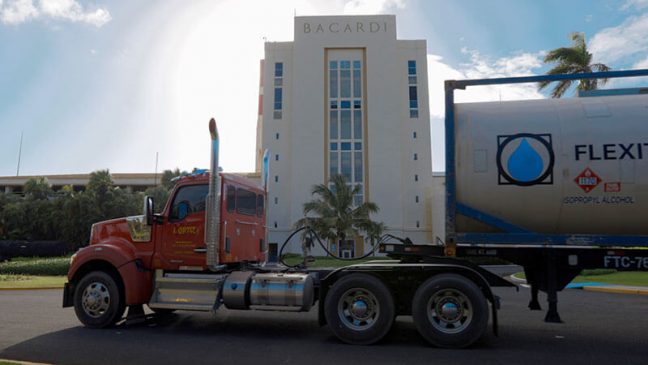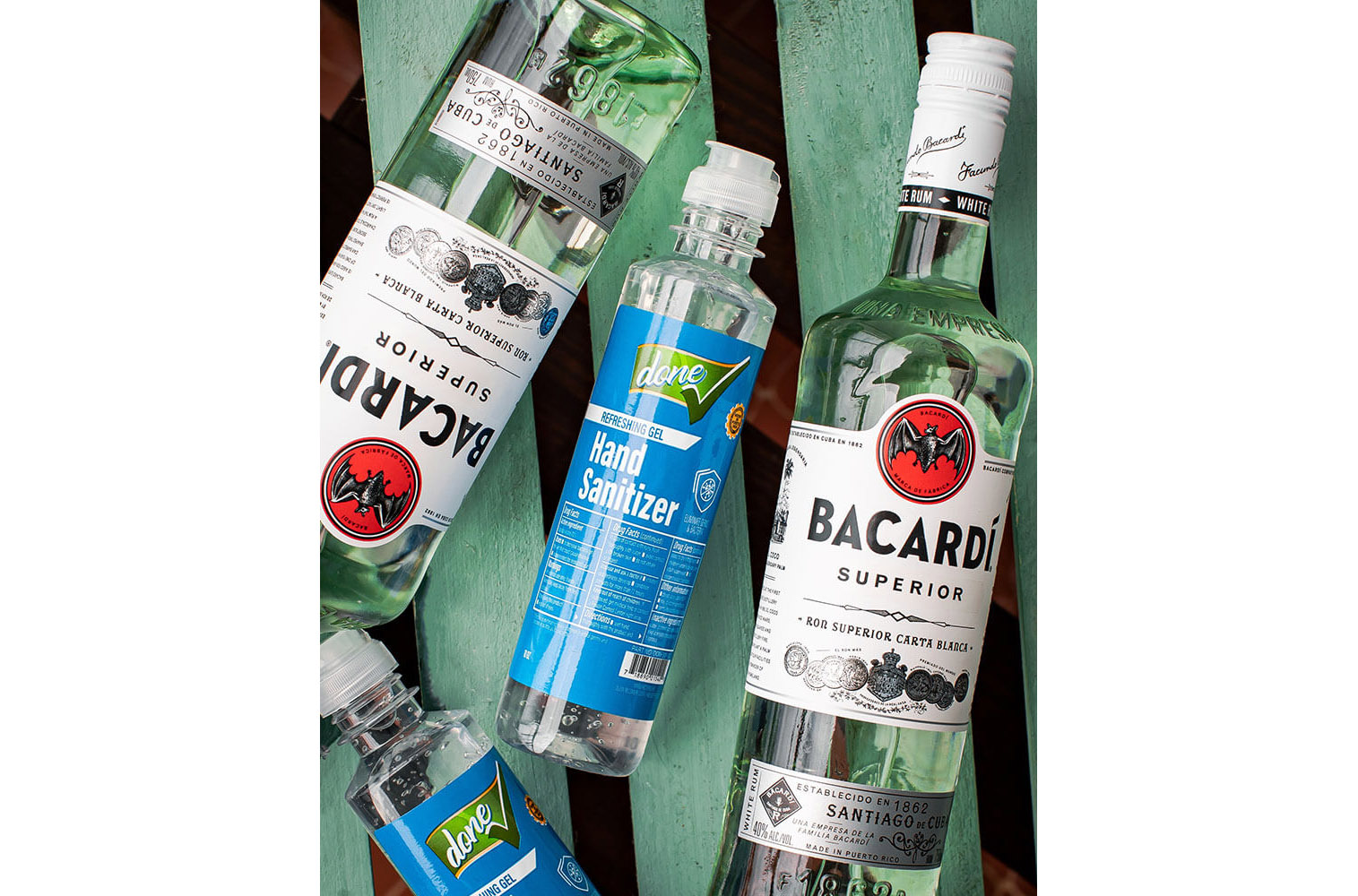As Covid-19 continues to spread across the globe, businesses and associations are working to find ways to contribute to the fight against the pandemic. As NGA and United Fresh Produce Association come together to help keep grocers stocked with fresh fruits and vegetables, Bacardi is using its facilities around the world to help make desperately needed hand sanitizer. And Facteus (formerly ARM Insight), has launched a report looking at consumer behaviors and economic trends during this public health crisis.
NGA, United Fresh Produce Association partner on produce procurement efforts
The National Grocers Association (NGA), the trade association representing the independent supermarket, and the United Fresh Produce Association have partnered to connect produce distributors to retailers.
“The entire food industry has come together incredibly during the coronavirus (Covid-19) outbreak, ensuring that Americans across the country have access to affordable and nutritious food,” said Greg Ferrara, NGA president and CEO. “Our collaboration with United Fresh will improve upon what has already been accomplished, keeping independent grocers stocked with fresh produce.”
NGA and United Fresh are connecting produce distributors who can deliver fresh produce and other items with independent supermarkets on a store-door basis. United Fresh and NGA will work with companies to assess their retail needs, as well as foodservice distribution communities and provide an opportunity for companies to network on business solutions.
“The fresh produce industry is committed to continuing to feed America. Foodservice distributors and processors have strong capabilities to deliver product, transportation and supply chain solutions in these unprecedented times,” said Tom Stenzel, United Fresh president and CEO. “We’re pleased to partner with NGA, working in tandem to get more fresh, healthy produce items in the hands of consumers.”
Bacardi diverts global production to increase hand sanitizer supply for local communities
Family-owned Bacardi has expanded its commitment across countries and brands to help produce more than 267,000 gallons (1.1 million liters) of hand sanitizer, as worldwide demand continues to exceed supply in efforts to reduce the risk of Covid-19. This week, eight Bacardi-owned manufacturing sites across the United States, Mexico, France, England, Italy and Scotland are joining the efforts, following last week’s announcement that Bacardi in Puerto Rico would supply alcohol to make hand sanitizers.
Across the sites, Bacardi is diverting its global production power, resources and processes to supply the much-needed alcohol essential for the increased production of hand sanitizers.
Bacardi also is playing a part in donating these products to local organizations and emergency responders, as well as its employees and contractors. In addition, the company is providing alcohol at cost to select partner companies looking to ramp up their production of hand sanitizers for commercial sale. These temporary, emergency actions at all locations will not disrupt the supply of brands in the Bacardi portfolio.
“Over our 158-year history, we have risen to many challenges and we are doing the same again in response to Covid-19,” said Jean-Marc Lambert, SVP of global operations for Bacardi. “All our brands and partners involved in this initiative will help people most in need benefit from the supply of these hand sanitizers. Our goal is to make a very real difference in the fight against Covid-19.”
The current list of sites providing support either immediately or in the coming week are:
- Bacardi rum in Puerto Rico partnered with Puerto Rico-based manufacturer Olein Refinery to provide raw materials that will enable the production of more than 1.7 million units of 10-oz. (300 ml) hand sanitizers. Donated product to local USPS, firefighters, police and non-profit Somos Unidos (United Way);
- Bacardi Bottling Corp. in Jacksonville, Florida is planning to help produce approximately 23,000 gallons (87,000 liters) to make 120,000 units of 25-oz. (750 ml) bottles of hand sanitizer for donation to local hospitals, firefighters and police. In addition, the team will supply 7,600 gallons (29,000 liters) to nearby manufacturers;
- Bacardi rum in Tultitlán, Mexico is supplying more than 5,200 gallons (20,000 liters) of alcohol to nearby manufacturer, Grupo Sterk, to help increase production of hand sanitizer by approximately 6,300 gallons (24,000 liters), of which 2,100 gallons (8,000 liters) will be donated by Bacardi to local communities in Tultitlán, Arandas and Atotonilco;
- Grey Goose vodka in Cognac, France, will supply 7,600 gallons (29,000 liters) of alcohol per day to French companies to increase supply of hand sanitizers by 9,500 gallons (36,000 liters) for local pharmacies, hospitals and the emergency services;
- Bombay Sapphire gin in Hampshire, England, is helping to produce a small quantity of hand sanitizers that will be donated to local doctors, chemists and care homes;
- Martini in Pessione, Italy is supplying alcohol for the production of 1,000 7-oz. (200ml) hand sanitizers for the local community, Red Cross and local emergency services;
- Dewar’s Blended Scotch Whisky in Aberfeldy, Scotland, is helping to produce a small quantity of hand sanitizers for the Scottish Ambulance Association among other local community groups;
- Angel’s Envy Kentucky Straight Bourbon in Louisville, Kentucky, is supplying nearly 1,000 gallons (3,800 liters) of alcohol to create approximately 16,000 8-oz. (250 ml) bottles of free hand sanitizers for first responders and healthcare professionals.
All hand sanitizers produced in collaboration with Bacardi contain more than the minimum alcohol content recommended by the World Health Organization for containing the spread of the virus.
Founded more than 158 years ago in Santiago de Cuba, the family-owned Bacardi Limited currently employs more than 7,000, operates production facilities in 11 countries and sells its brands in more than 170 countries.
Facteus launches consumer economic impact report
Facteus (formerly ARM Insight), a provider of actionable insights from financial data, has launched the Facteus Insight Report on Consumer Spending and Transactions (FIRST). The report provides a critical lens into consumer behaviors and economic trends derived from financial transaction data covering more than 1,600 companies and 430 publicly traded stock tickers, the company says.
FIRST is based on millions of regulatory-compliant consumer transactions that are sourced directly from financial institutions, fintechs and payments companies. Business and investment analysts using Facteus data gain a granular understanding of consumer behavior trends at the industry level (retail, entertainment, hospitality, etc.) or at the specific company level. This insight is increasingly valuable as the economic landscape shifts with the evolving conditions created by the Covid-19 global pandemic, the company says. The initial report may be found here.
“The world we now live in is changing rapidly, and it will be difficult to understand the impact on our communities and the economy for some time, as official statistics and survey reports are typically published with a multiple week lag time,” said Randy Koch, CEO of Facteus (formerly ARM Insight). “Our business is focused on understanding the world through the lens of financial transaction data and our data is updated daily, which allows us to provide business leaders and analysts near real-time visibility into what is going on in the economy. We understand the economic landscape is very fluid right now, and we will be regularly sharing more insights in the coming weeks as it relates to the impacts on consumer spending. Our intent is to help businesses, governments and economists have a current, accurate view of the COVID-19 data, so that they can make informed and timely decisions.”
FIRST will be updated weekly with metrics and data points as a resource for those seeking to make strategic decisions throughout the course of the COVID-19 epidemic and to track the economic rebound once the curve of infection is reduced.
Highlights from FIRST that quantitatively measure the effects of the changes in consumer behavior over the past few weeks include:
- During the week of March 9, consumer spending at supermarkets surged 43 percent year-over-year, before decelerating to 29 percent the week of March 16;
- Consumer spending at drug stAs Covid-19 continues to spread across the globe, businesses and associations are working to find ways to contribute to the fight against the pandemic.ores and pharmacies was up 22 percent year-over-year for the week of March 9, and 15 percent the week of March 16, well above trend for the year;
- Liquor, beer and wine stores sold 20 percent more in the week of March 9 than the preceding year and surged 60 percent in the week of March 16;
- Customers of wholesale clubs increased spending 26 percent year-over-year the week of March 2, and 54 percent the following week, but decelerated their purchases sharply in the week of March 16, with spending growing 20 percent;
- Spending at discount stores and dollar store transactions grew 30 percent and 47 percent, respectively, but decelerated their purchases sharply in the week of March 16, with spending growing 20 percent; and
- Spending at movie theaters was down over 90 percent year-over-year in the week of March 16 and spending at amusement parks fell over 80 percent in the same period.
Headquartered in Portland, Oregon, Facteus works with more than 1,000 financial institutions and payments companies.

